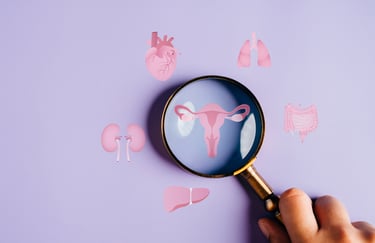eStoreRx™
Online Supplement Dispensary
eStoreRx™ is an easy direct-to-patient ordering & fulfilment program for lifelong wellness.
For over 40 years, Biotics Research Corporation has revolutionized the nutritional supplement industry by utilizing “The Best of Science and Nature”. Combining nature’s principles with scientific ingenuity, our products magnify the nutritional
eStoreRx™ is an easy direct-to-patient ordering & fulfilment program for lifelong wellness.
Biotics Research is proud to expand our commitment to education with the Wellness Unfiltered Pro Podcast. Each episode delves into key health topics and the clinical applications of our premier products. Through candid, insightful conversations, our team offers practical guidance to keep you informed and empowered as a healthcare professional.
February 26 2026
A study published recently in the Journal of Cachexia, Sarcopenia and Muscle raises concerns about a possible side-effect of long-term statin drug use...
 A paper just published in the August 2023 issue of the journal Reproductive Toxicology adds to the body of literature showing that dietary carbohydrate reduction is beneficial for women with polycystic ovarian syndrome (PCOS), and that a ketogenic diet may help improve the likelihood of a successful pregnancy in women with PCOS undergoing in vitro fertilization (IVF) treatment.
A paper just published in the August 2023 issue of the journal Reproductive Toxicology adds to the body of literature showing that dietary carbohydrate reduction is beneficial for women with polycystic ovarian syndrome (PCOS), and that a ketogenic diet may help improve the likelihood of a successful pregnancy in women with PCOS undergoing in vitro fertilization (IVF) treatment.
A past blog article covered the role of hyperinsulinemia as a driving factor in PCOS, and this newest paper, “Adding a ketogenic dietary intervention to IVF treatment in patients with polycystic ovary syndrome improves implantation and pregnancy,” shows the real-world effects that can come from simply restricting one’s carbohydrate intake.
The study involved twelve subjects with PCOS, all of whom were classified as either overweight or obese, and had been unsuccessful with at least one previous round of IVF. The dietary intervention called for approximately 1800 calories per day with a total carbohydrate intake of 50 grams or less, and ketosis was confirmed via urine testing. Reported carbohydrate consumption decreased from an average of 208 g/day to 42 g/day. Average weight loss across approximately 14 weeks was 7.9 kg, and improvements in various metabolic parameters were impressive: fasting glucose decreased by over 11 mg/dL, triglycerides decreased an average of 44 mg/dL, fasting insulin decreased by 11 mIU/mL, and HOMA-IR decreased by over 3 points.
These results are impressive by themselves, but things get even more interesting when we turn to the effects on embryo implantation and successful pregnancy. Compared to their previous IVF cycle, IVF combined with a ketogenic diet produced no difference in oocyte number, fertilization rate, or viable embryos produced, but there were substantial improvements in implantation rate (83.3 vs. 8.3% for previous cycle), clinical pregnancy (66.7 vs. 0%), and live birth rates (66.7 vs. 0%). The researchers wrote, “Here, restriction in carbohydrate consumption in PCOS patients induced ketosis, improved key metabolic parameters, and decreased IR. Even though this did not affect oocyte or embryo quality or quantity, the subsequent IVF cycle significantly improved embryo implantation and pregnancy rates.”
This more recent study echoes the findings of an earlier, small pilot study of five women with PCOS in which a ketogenic diet resulted in substantial improvements in numerous hormonal parameters and two of the five subjects became pregnant (without fertility treatment) despite previous failed attempts with fertility treatments.
Women with PCOS who have been unsuccessful with fertility treatments may want to consider adopting a ketogenic diet in conjunction with future treatments to potentially increase the odds of a successful pregnancy.
Submit this form and you'll receive our latest news and updates.
“The pharmacological targeting of ketone body metabolism has emerged as a novel therapeutic approach to improve cardiac ...
Learn morePeople commonly adopt ketogenic diets with the goal of losing weight, but what about the other side of this: can keto he...
Learn moreA paper published recently in Frontiers in Nutrition makes a case for why ketogenic diets with a specific emphasis on so...
Learn more
*These statements have not been evaluated by the Food and Drug Administration. This product has not intended to diagnose, treat, cure, or prevent any disease.
© 2025 Biotics Research Corporation - All Rights Reserved
Submit your comment